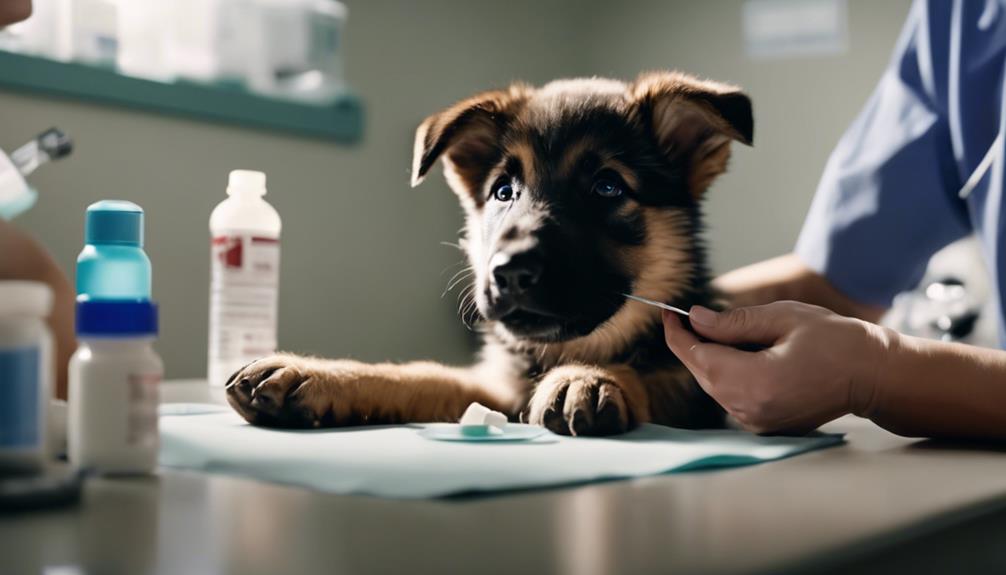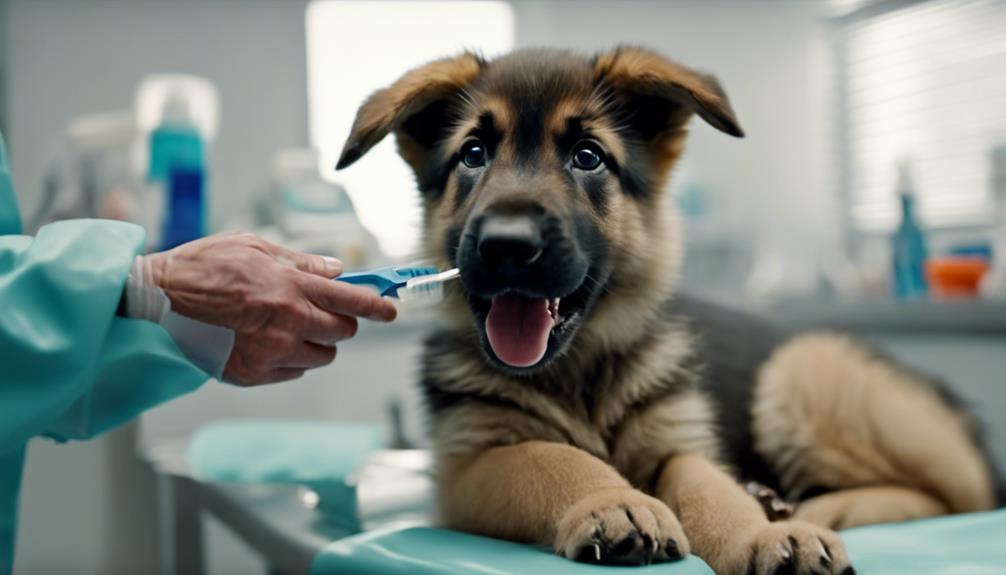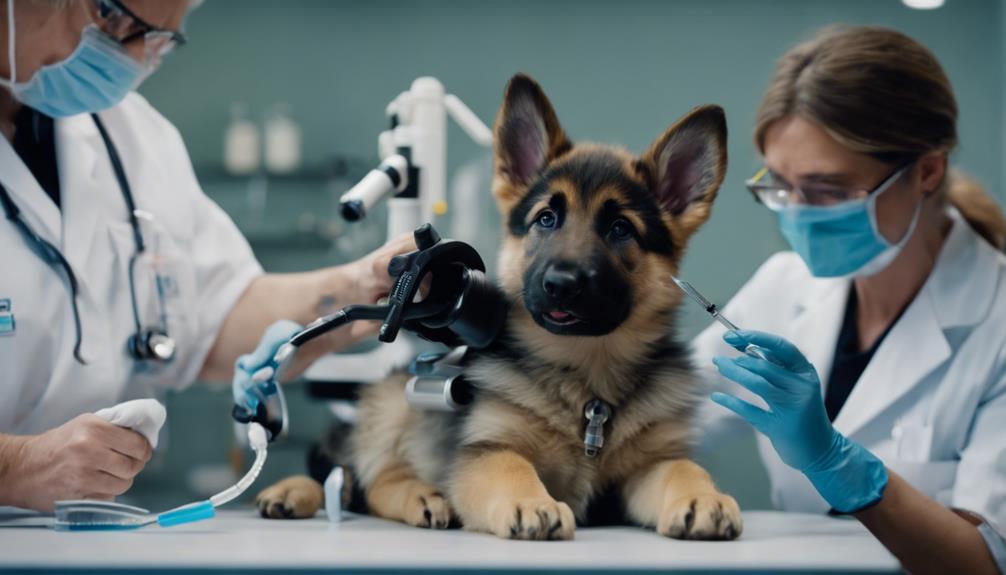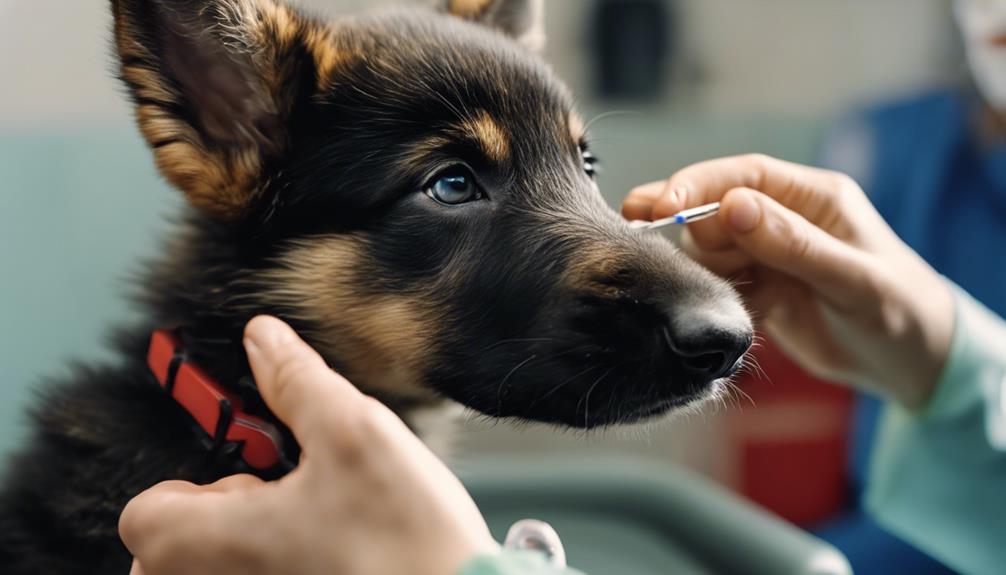🐾 Paw-some Partnership Alert! 🐾
As a pack of German Shepherd enthusiasts at MixGermanShepherd.com, we're always sniffing out the best products for our furry friends. Guess what? When you fetch something from Amazon through our links, we earn a little treat! 🦴
Are you aware of the essential early health interventions that German Shepherd mix puppies require for a healthy start in life? These interventions can significantly impact their well-being and future quality of life. From vaccinations to socialization techniques, each aspect plays a crucial role in setting up your furry companion for a lifetime of health and happiness. By implementing these interventions early on, you can ensure your German Shepherd mix puppy grows into a thriving adult dog.
Key Takeaways
- Tailored vaccination plans and preventative care are crucial for the health of German Shepherd mix puppies.
- Providing a balanced diet and proper nutrition supports optimal growth and overall well-being.
- Regular exercise, mental stimulation, and socialization are essential for holistic development.
- Early health monitoring, screening, and training contribute to a well-rounded and healthy adult dog.
Vaccination Schedule

German shepherd mix puppies should receive their first round of vaccinations at 6-8 weeks of age to protect against common diseases like parvovirus, distemper, and adenovirus. Vaccination is crucial in providing immunity against these potentially fatal illnesses. The initial vaccines help kickstart the puppy's immune system, preparing it to fight off these diseases effectively. Following this, the second round of vaccinations, typically administered at 10-12 weeks, serves to boost the immunity further, ensuring comprehensive protection. The final round of vaccinations, given at 14-16 weeks, completes the initial series, providing long-lasting immunity.
It's important to adhere to the recommended vaccination schedule to safeguard the health and well-being of your German shepherd mix puppy. These vaccinations are designed to prevent infectious diseases that can be prevalent in young puppies. Consult with your veterinarian to create a tailored vaccination plan based on your puppy's individual needs and risk factors. By staying proactive with vaccinations, you are taking a significant step in ensuring a healthy start for your furry companion.
Deworming Protocol

Initiate the deworming protocol for your German Shepherd mix puppy at 2 weeks of age to eradicate internal parasites effectively. Deworming is crucial in preventing potential health issues like stunted growth, diarrhea, vomiting, and anemia in puppies. Here are some essential points to consider when deworming your furry friend:
- Start deworming at 2 weeks of age
- Repeat treatments every 2-3 weeks until 12 weeks old
- Consult a veterinarian for the appropriate medication and dosage
- Ensure to follow the deworming protocol for the overall health and well-being of your German Shepherd mix puppy
Nutrition Guidelines

To ensure optimal growth and development in your German Shepherd mix puppy, it is essential to provide a balanced diet rich in high-quality proteins, essential nutrients, and vitamins according to their specific needs. As a large dog breed, German Shepherds have distinct nutritional requirements that should be met through a puppy-specific diet formulated for large breed puppies. This specialized diet can help prevent nutritional deficiencies and support healthy bone and muscle growth, ensuring your puppy develops properly. It is crucial to avoid overfeeding to prevent obesity and related health issues, so follow feeding guidelines based on your puppy's age, weight, and activity level.
When transitioning your German Shepherd mix puppy to solid food from milk or puppy formula, do so gradually to support their digestive system and prevent stomach upset. Consulting with a veterinarian is recommended to receive personalized nutrition recommendations tailored to your puppy's specific needs. By following proper feeding guidelines and providing a nutritious diet, you can promote the overall health and well-being of your German Shepherd mix puppy.
Socialization Techniques

Properly introducing your German Shepherd mix puppy to diverse stimuli and environments is crucial for fostering well-rounded behavior and temperamental stability. Early socialization techniques play a vital role in shaping your puppy's future behavior. Here are some key strategies to help your German Shepherd mix puppy socialize effectively:
- Exposure to Various Stimuli: Introduce your puppy to different sounds, textures, and experiences to build confidence and prevent fearfulness.
- Interaction with People: Encourage positive interactions with a variety of individuals to promote friendliness and reduce the likelihood of aggression.
- Encounters with Animals: Arrange safe meetings with other animals to teach your puppy appropriate social behaviors and communication skills.
- Consistent Positive Reinforcement: Reward good behavior during socialization to strengthen the desired responses and encourage learning.
Early socialization can significantly impact your German Shepherd mix puppy's emotional well-being and behavior in the long run. By implementing these techniques consistently, you can help your puppy grow into a well-adjusted and adaptable adult.
Early Obedience Training

Begin early obedience training with your German Shepherd mix puppy to establish positive behavior patterns and strengthen your bond with them. Training should commence around 8 weeks old to capitalize on the critical learning period of German Shepherd mix puppies. Utilize consistent training methods and positive reinforcement techniques to mold your puppy's behavior effectively. Basic commands such as sit, stay, come, and leash walking should be introduced gradually to lay a solid foundation for further training endeavors. Socialization plays a crucial role during obedience training, helping your puppy interact with other dogs, people, and various environments to prevent behavioral issues and boost their confidence. Remember, patience is key when training your German Shepherd mix puppy, as they respond best to positive reinforcement and consistent guidance. By starting early and employing these strategies, you can instill good behavior habits and build a strong relationship with your furry companion.
Flea and Tick Prevention

Implementing effective flea and tick prevention measures is essential for safeguarding the health and well-being of your German Shepherd mix puppy. German shepherd mix puppies are prone to infestations and potential health risks from these parasites, making prevention a crucial aspect of their care. To protect your furry companion, consider the following tips:
- Utilize Vet-Approved Treatments: Topical treatments, oral medications, or collars recommended by your veterinarian can effectively shield your German Shepherd mix puppy from fleas and ticks.
- Regular Grooming: Consistent grooming practices can help detect and remove any fleas or ticks present on your puppy's fur, aiding in prevention efforts.
- Environmental Management: Keeping your living spaces clean and treating outdoor areas can reduce the risk of flea and tick infestations for your German Shepherd mix puppy.
- Consult Your Veterinarian: Discussing prevention methods with your vet ensures that the chosen approach is safe and suitable for your German Shepherd mix puppy's specific needs.
Dental Care Importance

Regular teeth brushing with dog-specific toothpaste and providing proper chew toys are crucial for maintaining your German Shepherd mix puppy's oral health. Preventing dental problems early on can save you from dealing with issues like plaque buildup, tartar accumulation, and gum disease later. Proper dental care not only ensures your puppy's comfort but also promotes a healthy mouth and overall well-being.
Teeth Cleaning Tips
Ensuring consistent teeth cleaning for your German Shepherd mix puppy is essential for preventing dental issues such as plaque buildup and periodontal disease. Here are some tips to help you keep your puppy's teeth clean and healthy:
- Start dental care early to help your puppy get used to the process and reduce the risk of dental problems in adulthood.
- Use dog-specific toothpaste and a soft-bristled toothbrush for regular teeth cleaning.
- Poor dental hygiene can lead to pain, infection, and tooth loss in German Shepherd mix puppies.
- Consider professional dental cleanings to maintain your puppy's oral health and prevent potential dental issues. Remember, early intervention and proper care are key to ensuring your puppy's dental well-being.
Preventing Dental Problems
To maintain optimal oral health for your German Shepherd mix puppy, it is crucial to prioritize preventive dental care to avoid common issues like plaque buildup, tartar formation, and gum disease. Regular brushing with a dog-specific toothbrush and toothpaste is essential for maintaining good oral hygiene in your puppy. Additionally, providing dental chews, toys, or treats specifically designed to promote dental health can help reduce plaque and tartar accumulation on your puppy's teeth. By implementing these preventive measures early on, you can prevent future dental problems and contribute to your puppy's overall health and well-being. Remember, professional dental cleanings by a veterinarian may be necessary to address any advanced dental concerns and ensure your German Shepherd mix puppy's oral health is in optimal condition.
Proper Chew Toy
For optimal dental health and hygiene in your German Shepherd mix puppy, providing appropriate chew toys is crucial. When it comes to dental care for German shepherd puppies, the right chew toys play a significant role. Here are some reasons why choosing the proper chew toys is essential:
- Chew toys help clean teeth and massage gums, reducing plaque and tartar buildup.
- Regular chewing on appropriate toys can prevent dental issues like tooth decay and gum disease.
- Strong chew toys satisfy their natural urge to chew, preventing destructive behaviors.
- Choosing toys made of safe materials and suitable sizes promotes healthy oral development.
Selecting the right chew toys for your German Shepherd mix puppy can contribute to their overall dental health and well-being.
Exercise Recommendations

To maintain optimal physical health and mental well-being for German Shepherd mix puppies, incorporating at least 30 minutes of daily exercise is crucial. Engaging in activities such as walking, running, and playing fetch not only helps improve muscle tone and joint flexibility but also provides essential mental stimulation. Interactive toys and puzzle games can be beneficial in preventing boredom and enhancing cognitive abilities in these intelligent pups.
When planning exercise sessions for your German Shepherd mix puppy, consider factors like age, size, and energy level to ensure the activities are suitable and safe. Tailoring the exercise routine accordingly can prevent overexertion and potential injuries. Regular physical activity during puppyhood sets a foundation for a healthy lifestyle, reducing the risk of obesity and behavioral issues later on.
Skin and Coat Care Tips

To maintain your German Shepherd mix puppy's skin and coat health, regular grooming with a gentle puppy-formulated shampoo is essential. Keep an eye out for dryness, redness, or excessive itching as potential signs of skin issues. Remember, a well-balanced diet and proper hydration are key factors in promoting a lustrous coat and healthy skin in your puppy.
Grooming Essentials for Puppies
Regular brushing of your German Shepherd mix puppy's coat is essential for distributing natural oils, reducing shedding, and preventing matting. To ensure the skin and coat of your puppy remain healthy, follow these grooming essentials:
- Use a puppy-specific shampoo and conditioner for cleanliness and health.
- Check for ticks, fleas, or skin irritations during grooming sessions.
- Trim your puppy's nails regularly to avoid overgrowth and potential injuries.
- Seek professional grooming services for specialized needs like haircuts or skin treatments. Remember, these grooming practices contribute to your puppy's overall well-being, keeping them comfortable and happy.
Managing Skin Allergies
Skin allergies in German shepherd mix puppies can cause itchiness, redness, and skin irritation, requiring careful management through grooming and dietary interventions. Regular grooming and bathing with hypoallergenic shampoos can help alleviate skin allergies. A balanced diet rich in essential nutrients like omega-3 fatty acids can significantly improve skin health in German shepherd mix puppies. It's essential to avoid potential allergens such as certain foods, plants, or chemicals to reduce skin reactions. Consulting a veterinarian for a proper diagnosis and treatment plan is crucial in addressing skin allergies effectively. By implementing these measures, you can help your German shepherd mix puppy manage skin allergies and enjoy healthier skin and coat.
Early Health Screening

Early health screening plays a crucial role in identifying genetic predispositions to common health issues in German Shepherd mix puppies. Screening for hip and elbow dysplasia, degenerative myelopathy, and other breed-specific concerns is essential to ensure the well-being of your puppy. Here are some key points to consider:
- Detecting Genetic Predispositions: Early screening can help detect potential health issues before they become serious problems.
- Proactive Management: Identifying issues early allows for proactive management and treatment, potentially improving your puppy's quality of life.
- Veterinary Recommendations: Based on screening results, veterinarians may suggest specific interventions or adjustments in care to address any health concerns effectively.
- Regular Check-ups: Regular health check-ups and screenings are crucial to monitor your German Shepherd mix puppy's health and address any issues promptly.
Parasite Control Measures

To maintain the health of your German Shepherd mix puppies, it is crucial to establish a deworming schedule and use veterinarian-recommended flea prevention products. These measures help protect your puppies from common internal and external parasites. By following proper parasite control measures, you can ensure the well-being and longevity of your German Shepherd mix puppies.
Flea Prevention Tips
For effective flea prevention in German Shepherd mix puppies, utilizing veterinarian-approved products like spot-on treatments, oral medications, or flea collars is essential. Regular grooming and cleaning of your puppy's living environment are also crucial in reducing the risk of flea infestations. Here are some practical tips to help you keep your furry friend flea-free:
- Use veterinarian-approved flea prevention products.
- Implement regular grooming and cleaning routines.
- Wash your puppy's bedding and toys frequently.
- Vacuum and clean your home thoroughly to eliminate flea eggs and larvae.
Deworming Schedule
Commence the deworming schedule for your German Shepherd mix puppy at 2 weeks old to target common parasites such as roundworms and hookworms effectively. Deworming every 2 weeks until your puppy reaches 12 weeks old is crucial to eliminate any parasites they may have acquired. Deworming medications, when administered as directed by your veterinarian, are safe and highly effective. Regular deworming plays a vital role in preventing potential health issues like diarrhea, weight loss, and stunted growth in German Shepherd mix puppies. Remember to consult your vet to establish a tailored deworming schedule that suits your puppy's specific health requirements and environmental conditions. Stay proactive in protecting your furry companion from parasites for their overall well-being.
Monitoring Growth and Development
Monitoring the growth and development of German Shepherd mix puppies is crucial for ensuring their overall health and well-being. To effectively track their progress, consider the following:
- Weight Gain and Growth Rate: Regularly monitoring the weight gain and growth rate of your German Shepherd mix puppy can help ensure they are developing at a healthy pace.
- Behavior and Energy Levels: Observing your puppy's behavior, energy levels, and mobility can provide insights into any potential health issues or developmental delays.
- Regular Veterinary Check-ups: Scheduled visits to the vet are essential for tracking the overall health, growth, and development of your German Shepherd mix puppy.
- Muscle Tone and Coordination: Assessing your puppy's muscle tone, joint flexibility, and coordination can aid in identifying any musculoskeletal concerns early on.
Frequently Asked Questions
How Do You Raise a Healthy German Shepherd Puppy?
To raise a healthy German Shepherd puppy, focus on nutrition guidelines, exercise routines, and socialization tips. Provide balanced puppy food, regular walks, playtime, and positive interactions with people and other dogs. These practices promote physical, mental, and emotional well-being.
What to Do When You First Get a German Shepherd Puppy?
When you first bring home your German Shepherd puppy, focus on bonding activities, training tips, and socialization techniques. Create a nurturing environment, establish routines, and provide proper nutrition. Setting a strong foundation early will benefit your puppy's development.
How Do You Take Care of a German Shepherd Mix?
To care for a German Shepherd mix, prioritize training tips for behavior, grooming essentials like brushing and nail trimming, and establish a regular exercise routine. Consistent training, grooming, and exercise foster a healthy, happy pup.
What Is the Most Common Health Issue in German Shepherds?
Hip dysplasia, a common issue in German Shepherds, affects their hip joints, causing pain and movement difficulties. Early detection through vet check-ups is vital. Behavioral training and proper exercise can help manage this condition effectively.
Conclusion
You've laid the foundation for your German Shepherd mix puppy's health with early interventions. Like a well-tended garden, these practices will help your puppy flourish and thrive. Stay vigilant in maintaining their health with regular check-ups, proper care, and monitoring their growth. With your dedication and commitment, your puppy will grow into a strong and resilient adult dog. Keep up the good work and enjoy the journey with your furry companion!
